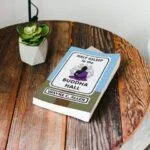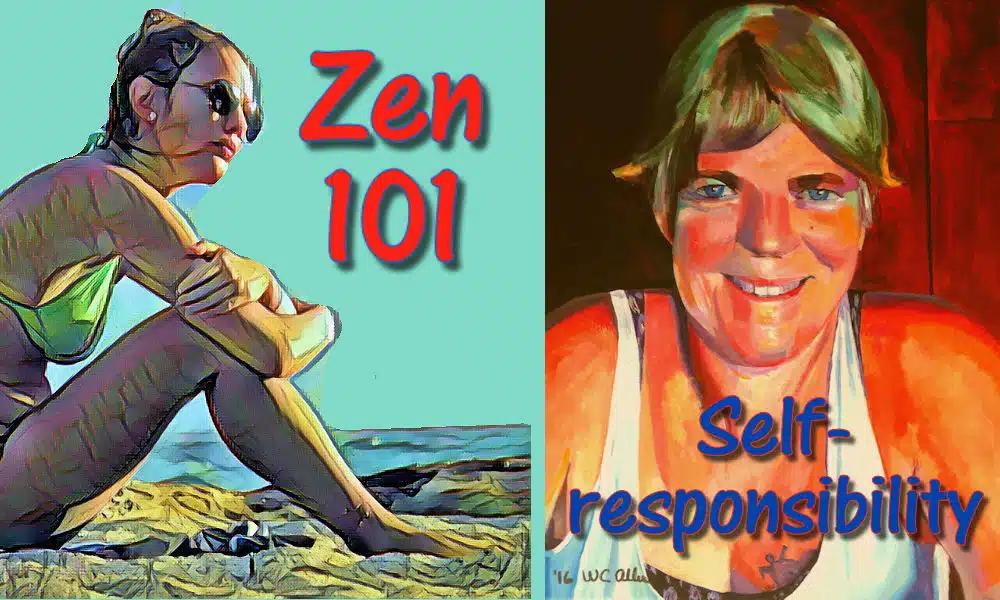Self-responsibility is hard, as we live in a time when blame is much more popular. Nonetheless, Zen is all about self-responsibility

Looking for more on this topic?
Check out my book, Half Asleep in the Buddha Hall.
Wayne’s “Eastern” book takes you by the hand and helps you to find peace of mind. Half Asleep in the Buddha Hall is a Zen-based guide to living life fully and deeply.
I’ve got a couple of ideas for today’s article, and it’s really great that they’ve come from reader comments.
So, the first thing I want to talk about today is the application of the four A’s. This follows up on a point from the previous article.
The four A’s describe the internal process of working through our experiences. Step-by-step, we work through Awareness, Acknowledgment, Acceptance, and Action.
But this technique, like all techniques, is prone to a very simple misuse.
We are all prone to externalize what is going on in our lives. We give ourselves credit for our successes and blame others for our failures — but what I really want to talk about is the concept of total self-responsibility.
This way of being is key to what I write about, and key to Zen. It’s the idea that all I can know is me — my thoughts, intentions, feelings — and all I can do is what I do. What others are doing only has an impact on me if I choose to create an impact.
Here’s the misuse:
When applying a new technique, we may easily “get” the language, but mess with the intent.
The point of everything we talk about is to develop a state of detached awareness.
What, you might ask, is it detached from? It is detached from the need to create an emotional reaction that leads us away from simple observation of self and the experience.
The four A’s are intimately intertwined with the pronoun “I”.
This is diametrically opposed to what I notice when I explain this technique. People will say stuff like,
“So I am aware that my boyfriend is a jerk, and I fully acknowledge what a big jerk he is, and I even accept but he’ll always be a jerk; where I get stuck is what to do (action) now.”
To the casual observer, this person is perfectly following the “4 As” technique, as she lists off the four aspects. She clearly “gets” the language.
But it doesn’t take great wisdom to see that the subject (the use of the 3rd person pronoun) of the 4 A’s totally misses the mark. She’s using the technique to maintain blaming and externalizing.
Here’s a more elegant application of the technique:
“So, I am aware that I have a tendency to judge my boyfriend, and I acknowledge my judgmental streak. I further accept that this is a part of my personality, and is an issue I want to work on, so it is my intention (this is how I will act) to notice, and stop myself when I shift into judging.”
An entirely different kettle of fish, eh?
The problem is that talking about someone else’s fault(s) solves nothing. It just reaffirms what we already believe. And endlessly lecturing another person on their perceived faults, while using ever more sophisticated techniques to try to make them change is still nothing more than bitching, moaning, and complaining.
Zen Lesson #9 — the pronoun is “I”

There is no easier way to say this – your job is to pay attention to you.
We hear this and tend to react by saying, “…but that’s so selfish!” I suspect people toss out the “selfish” word as yet another way to stay focused completely on (the “sins” of) others.
One of the chief lessons that comes from Zazen is the awareness of just how much crap our minds generate. We’re always looking around, judging, criticizing, blaming. It’s what our minds do best. This does not change the point.
Nothing in your life changes if you don’t change it. Your pain doesn’t stop until you stop hurting yourself.
There may be a grim satisfaction that comes from blaming others, but all you get is that grim satisfaction — nothing else changes — and there you sit, in a pile of mud of your own creation.
The solution is endless application of the four A’s, using the pronoun “I”. Here is who I am, here is what I am doing, here is what is working for me, here is what needs to stop. And then… wait for it… you actually have to do it!
Zen Lesson #10 — there is little we can know
I received a blog comment regarding the last article — and intrigued myself over the last sentence.
“When you don’t have that mindset it’s a great challenge to get your mind thinking in a different direction as long as you know it will benefit you.”
The mindset he was describing is doing as opposed to just thinking.
I’m not particularly interested in noticing how the writer describes acting as “thinking in a different direction” — what he is really describing is getting caught in a thought loop that goes nowhere — and how difficult it can be to escape this pattern.
What I want to say something about is the last clause:
“… as long as you know it will benefit you.”
Life in the 21st century, especially in the West, is built on the flimsy foundation of (eventual) reward. Virtually everything we buy is sold on the basis of all the great things that are going to happen–eventually–if we buy the product.
It’s like the really old joke:
Two Newfies are visiting Toronto. They discover they have a five dollars between them. They really want to have a bunch of great experiences. One of the guys takes the sawbuck and goes into a drugstore. He walks out with a box of tampons. He says, “Problem solved!” His friend says, “What are you talking about?” The guy says, “I saw it on TV. You can go horseback riding with Kotex, you can go swimming with Kotex, you can go dancing with Kotex…”
Anyway, it’s really silly to think that we focus solely on future benefit.
When we teach the communication model, we often hear, “I’m willing to try this, but only if my partner does too.”
And then they go on to explain that in the past, their partner has let them down, and therefore will likely let them down again, and they don’t want to put all that effort into learning how to communicate before they can be totally assured that it’s all going to work out the way they imagine it might.
We demand assurances because we fear death — the greatest uncertainty of all
Most of us hate thinking about dying, and do whatever we can to avoid the subject. We even use euphemisms for death — “passed away,” “moved on,” saying, “I lost my mother,” to which I often reply, “Do you want help looking for her?”
Because of this innate fear of the inevitable, many are endlessly looking for assurances and security. We’re willing to stay stuck in deadly situations — deadly for our hearts, deadly for our souls — if someone cannot or will not promise us in advance that doing something different is going to make it all better.
And no one can.
John Lennon had it right when he sang, “Life is what happens while we’re busy making other plans.” Within a very short time after recording this line, he was shot and killed by a deranged fan. There are no assurances, about anything! This is just the way it is.
So the important question is, what can I do right now to fully and completely live my life in this moment?
It is impossible to know now what will benefit me in the future.
You might have to wrap your head little bit to get around this one, but imagining an outcome and experiencing an outcome are absolute opposite things.
So, let’s go back to the idea of the communication model, or the four A’s –
You can sit there and think about what might possibly happen were you to use either or both of these techniques. You can draw pictures in your head, have conversations with imaginary people, think about outcomes, think about differences, and at the end of the day you know precisely nothing.
Or, you can do the communication model, you can use the four A’s, and then you can see what actually happens. If you like it, do more of it. If it doesn’t work, do something else.
Doing things this way is direct and simple. You do something, you evaluate the results. No one else is involved — it’s just you observing you. The more you apply the technique, the easier it gets, and the more interesting the results become.
This is so with anything we learn — it’s hard until it’s simple.
Today’s lesson is this. Zen living is not an intellectual pursuit — it’s a way of acting and being. When sitting, you sit. When communicating, you communicate. When eating, you eat.
Nothing we do is for an eventual benefit, because there is no eventual. There is just the now in which I act, and now in which I observe the results of my action. No assurances. No manipulation. No games. Just living with attention.
